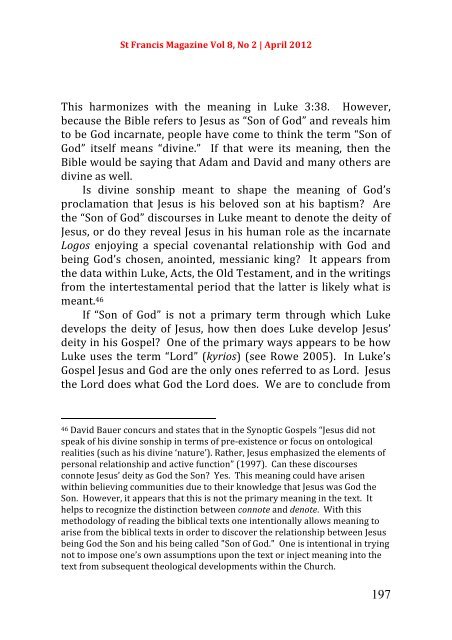Untitled - St.Francis Magazine
Untitled - St.Francis Magazine
Untitled - St.Francis Magazine
Create successful ePaper yourself
Turn your PDF publications into a flip-book with our unique Google optimized e-Paper software.
<strong>St</strong> <strong>Francis</strong> <strong>Magazine</strong> Vol 8, No 2 | April 2012 This harmonizes with the meaning in Luke 3:38. However, because the Bible refers to Jesus as “Son of God” and reveals him to be God incarnate, people have come to think the term “Son of God” itself means “divine.” If that were its meaning, then the Bible would be saying that Adam and David and many others are divine as well. Is divine sonship meant to shape the meaning of God’s proclamation that Jesus is his beloved son at his baptism? Are the “Son of God” discourses in Luke meant to denote the deity of Jesus, or do they reveal Jesus in his human role as the incarnate Logos enjoying a special covenantal relationship with God and being God’s chosen, anointed, messianic king? It appears from the data within Luke, Acts, the Old Testament, and in the writings from the intertestamental period that the latter is likely what is meant. 46 If “Son of God” is not a primary term through which Luke develops the deity of Jesus, how then does Luke develop Jesus’ deity in his Gospel? One of the primary ways appears to be how Luke uses the term “Lord” (kyrios) (see Rowe 2005). In Luke’s Gospel Jesus and God are the only ones referred to as Lord. Jesus the Lord does what God the Lord does. We are to conclude from 46 David Bauer concurs and states that in the Synoptic Gospels “Jesus did not speak of his divine sonship in terms of pre-‐existence or focus on ontological realities (such as his divine ‘nature’). Rather, Jesus emphasized the elements of personal relationship and active function” (1997). Can these discourses connote Jesus’ deity as God the Son? Yes. This meaning could have arisen within believing communities due to their knowledge that Jesus was God the Son. However, it appears that this is not the primary meaning in the text. It helps to recognize the distinction between connote and denote. With this methodology of reading the biblical texts one intentionally allows meaning to arise from the biblical texts in order to discover the relationship between Jesus being God the Son and his being called "Son of God." One is intentional in trying not to impose one’s own assumptions upon the text or inject meaning into the text from subsequent theological developments within the Church. 197







![Reflections on Surah Fatiha and the Lord's Prayer[1] - St.Francis ...](https://img.yumpu.com/49377951/1/184x260/reflections-on-surah-fatiha-and-the-lords-prayer1-stfrancis-.jpg?quality=85)








